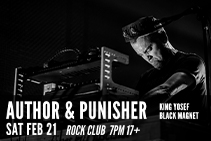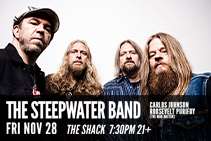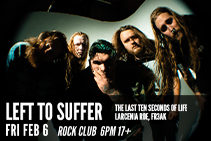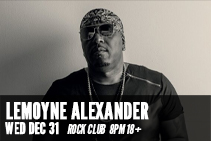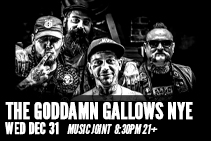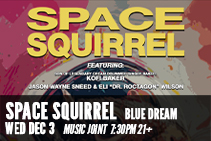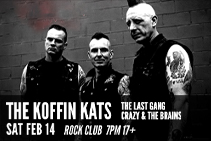BULLIED BY STRINGS
BULLY IN THE HALLWAY
BUMPUS
BUN B
BURLESQUE BY RED HOT ANNIE!
BURLESQUE TWINS/ DEIRDRE DOLL
BURLESQUE TWINS/ MINA MECHENTE
BURN SAND BURN
BURN TIBET
BURNING LOVE
BURNING MAN
BURNING THE MASSES
BRAINCHILD
BRANDON MCHOSE
BRANDON REID
BRANDON WETHERBEE AND FRIENDS
BRAVE ULYSSES

BREAD AND BOTTLE
Bread and Bottle is a Chicago punk rock band formed in 2005. Band founder Gus Fuller played guitar for the Repellents while bassist Ryan Scaccia currently plays bass with labelmates Das Kapital. Nothing would be complete without rhythm guitar player Eric Scaccia, and drummer/vocalist Donald Murphy.
BREAKERS BROKEN
BREATHE CAROLINA
BREATHE ELECTRIC
Born in the Chicago suburban basement of brainchild Grant Harris in 2007, Breathe Electric was created with you–the listener and soon-to-be biggest fan–in mind. They know the melodies you want to hear and have no qualms with delivering them through heaps of hook and catchy sing-a-long choruses. The strong minds of Japan have already tapped into this resource with an album release, as have many Hot Topics across America. Breathe Electric knows that you love to dance; they encourage it, using both electronic and acoustic drum beats for maximum boogie potential (MBP). Since you enjoy an energetic live show centered around smiles and MBP, the band is likely on their way to your town right now. So be a good host and go visit your new friends. After all, they are thinking of you.
BRECKENRIDGE

BRENDAN KELLY OF LAWRENCE ARMS
Brendan Kelly is the bassist/vocalist of Chicago-based punk band The Lawrence Arms, as well as guitarist/lead vocalist in The Falcon and Brendan Kelly and the Wandering Birds. Kelly’s former bands include Slapstick and The Broadways. He is known for his raspy vocals, drunken demeanor, and onstage witticisms.
BRETT MITCHELL & THE GIANT GHOST
BRIAN BONZ
BRIAN DUGAN
Might be spelled Duggan
BRIAN JORDAN
BRIAN MARTIN
BRICE WOODALL
BRICKFIGHT
BRIGHTEN UP
BRITTANY SHANE
BROKEN BELTS
BROKEN GOLD

BROKENCYDE
Brokencyde – Will Never Die”.
Brokencyde began making headlines after the group’s video for the track “Freaxxx” spread like a virus and racked up more than 4 million hits on YouTube. Since then, the group has put a stranglehold on the online world, developing an enormous fanbase that helped catapult their debut album, “I’m Not A Fan But The Kids Like It”, to #87 on the Billboard Top 200. Since then, the group has become one of the most talked about musical entities in decades, as MTVU, The LA Times, Revolver Magazine, producer Steve Albini and comic book writer Warren Ellis all cannot stop talking about the band that everyone loves to hate.
“On our last record we had a song called ‘Schitzo’ that took on new meaning as we toured in support of the album. There is a line in the song that says, ‘Brokencyde will never die!’ and we thought it was the perfect title for this record,” says Se7en from Brokencyde. “The title is a big middle finger to all the haters that to try to bring us down by spreading rumors and lies. We’ve taken all their hate and used it as fire to create this new album.”
For their new album, Brokencyde have pulled out all the stops to ensure that “Brokencyde – Will Never Die” is overflowing with salacious crunk. The album gets the party rocking with the sugary sweet pop/dance of the lead single “House Party”, and slips into some down and dirty hip-hop on “Karma Sutra”, “My Gurl” shows the band experimenting with contemporary R&B hooks, and Kottonmouth Kings’ Daddy X lays blazes through the reggae infused “High Timez”. Put together as a whole, “Brokencyde: Will Never Die” adds a polish and sparkling shine to Brokencyde’s infectious brand of crunkcore.
“With this record, we allowed ourselves more time creatively to do what we wanted, which enabled us to take things to a whole new level,” commented Mikl from Brokencyde. “This album speaks to our amazing fans that have supported us through thick and thin, but has a little something for everyone so it can appeal to new listeners.”
“I have to say this album is the best work we’ve ever put together,” adds Phat J. “Fans are going to love it, and haters beware because it’s gonna destroy the game.”
Brokencyde have endured and persevered through obstacles that would have broken bands. On November 9th, 2010 these crunk kids from Albuquerque, NM are sending a message to their detractors that they are here to stay…. Brokencyde “Will Never Die”.
BROMANCE
BROOKAH
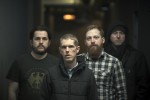
BONGRIPPER
BONGRIPPER IS A FOUR-PIECE INSTRUMENTAL DOOM BAND FROM CHICAGO. SINCE 2006 THEY HAVE RELEASED 6 FULL-LENGTH ALBUMS. THEIR LATEST ALBUM, MISERABLE, WAS RELEASED LAST SUMMER.

BONZO TERKS
By pushing the boundaries of composition and improvising together cohesively, Bonzo Terks excels in unique, original and creative music. It is jazz with a startling youthful energy but make no mistake, the sound is grown-up, sophisticated, unwavering.
Harboring members that explore spontaneous composition, free jazz, ambient & textural music, noise, tape manipulations, the Quartet takes an unconventional approach to creating their unique brand of music.
BOOK OF BLACK EARTH
BOOMJUICE
BOOMSNAKE

BOOTS WITH SPURS
Boots with Spurs is a four piece progressive rock band from Chicago, IL. The band just finished it’s second album, entitled “Voodoo or Die: The Sun Never Sets Part 2” released May 5th, 2012. This album is the second installment of their two part conceptual project and features a new member in vocalist, Ty Wyffels. Ty joins original members: Clay Bail, Matt Gonzalez, and David Lugo as they plan on bringing their hard hitting, psychedelic approach to progressive rock to the Chicago music scene.
“{Boots with Spurs music} makes Pink Floyd’s ‘The Wall’ look like a nursery story, whilst Coheed & Cambria can no longer be deemed the most imaginative band on the planet.” “I’d hazard a guess that the world just simply is not ready for these kind of ludicrous tales.”
– album review from music blog, “The Only Thing I Know For Sure”


